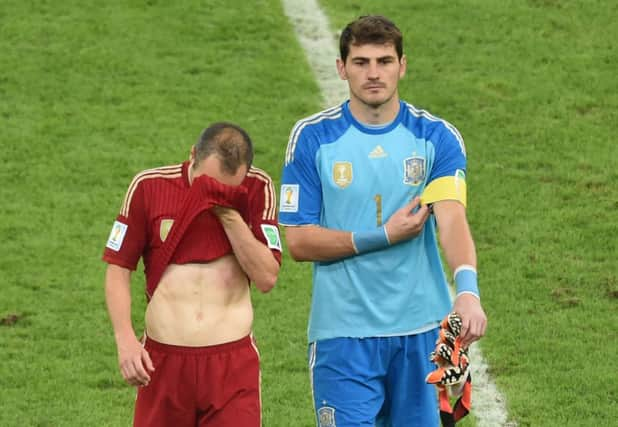Death in the Maracana as Spain era ends


Each has been grabbed by TV or radio for a soundbite and they have all said the same thing: this is football’s spiritual home and of course they had to make their pilgrimage. So who was the disciple nabbed by the BBC’s Radio 5 Live just before the game which would confirm Spain’s demise? Tony Pulis.
A long-ball vulture descending on the Maracana to see tiki-taka laid to waste? Possibly that’s unfair on Pulis whose Crystal Palace seem more aesthetically-pleasing than his Stoke City, though that would not be hard. For maybe Pulis loved this Spain like the rest of us, the greatest national team there has ever been. The Brazil of Pele, Gerson and Carlos Alberto who won the 1970 World Cup were great, but the Spain of Xavi, Andres Iniesta and Xabi Alonso have won more: two European Championships either side of a World Cup, and they were going for the quadruple. Instead, as the Spanish newspaper 20 Minutos put it: “Farewell to the world. Humiliated, beaten, crushed, without pride or honour. In the saddest way.”
Advertisement
Hide AdAdvertisement
Hide AdHistory will show that on the day they lost their crown, so did the Spanish king. Yesterday’s front pages recorded for posterity the abdication of King Juan Carlos and that of the players for whom the 2-0 defeat by Chile confirmed this had been one tournament too far. Said El Pais: “The Spanish soccer team that has been the most deserving of a royal farewell ended its fairytale in an atrocious way, in a world fiasco.”
In going for the unprecedented success, Spain ended up with a unique failure: they are the only champions to bow out after just two matches of the group stage. Alonso admitted it was the end of an era. “We haven’t been able to maintain the same levels of conviction, of hunger,” he said. “The happiness of before is gone. It’s a completely unexpected failure but we have to take the great sadnesses as we take the great joys – as men.”
Win, lose or abdicate, a What the Papers Say round-up of Spain’s press is always illuminating. No “Turnips!” or rubbish jokes about Portuguese testicles here. El Mundo said: “Spain reached the end of the most beautiful time in its history. There was no better land in which to do it. Two European Championships and the World Cup after a tyrannical reign, the squad is buried at the Maracana with the same noise of a giant collapsing.”
The sports paper Marca called for acclaim after the tears: “It is logical that the Spanish fans are disappointed, but the respect they should have for this selection should be eternal.” And being a sports title, it felt it could ignore the King signing his abdication papers and devote the entire front page to a striking overhead photograph of Iniesta trudging off the field, finally free of his Chilean pursuers who had harried him constantly, but also perhaps no longer the world’s greatest midfielder.
There were harsher words if you cared to look for them. AS said: “The ending was horrible. It had to come sometime, but never could such a painful, so unrecognisable and vulgar farewell be imagined.” Certainly, the “unrecognisable” bit was true on Wednesday night as tiki-taka tried to accommodate a big man up front – Il Gallumphico, Diego Costa. The Chelsea-bound striker may not have been fully fit but in Spain’s two defeats he managed just 50 touches, none of which amounted to a shot on target. No wonder Irvine Welsh, the Bard of Leith now residing in Chicago, tweeted: “Costa in this team looks like a steaming hot plate of pie and mash going down the conveyor belt at Yo Sushi!”
Coach Vicente del Bosque tinkered too much and then too little. “Why change your style of play for someone who probably isn’t fit?” wondered the BBC’s Gary Lineker. Del Bosque did drop Xavi and Gerard Pique after the 5-1 thumping by the Netherlands but Costa, Iker Casillas and David Silva must have been under threat. These three ended up being poor again while David de Gea, David Villa and Cesc Fabregas stayed on the bench. Meanwhile, Manchester City’s bucaneering frontman Alvaro Negredo never even got on the plane.
See, we’re all Spanish now. Or have been for the last six years. Beautiful football by football’s great underachievers, who suddenly started overachieving like mad. The tiki-taka was finessed and finessed, some would say over-finessed. At the last Euros, Spain thought they could do without a striker – and if you don’t count Fernando Torres; these days it’s easy – they did. But then Carles Puyol, the heavy-lifter, retired. Del Bosque didn’t seem to notice the creaks, or couldn’t quite bring himself to repair them. The carousel – Sir Alex Ferguson’s description of Barcelona’s death-by-a-thousand-passes but he could just as easily have meant Spain’s – kept turning, albeit a bit slower. Meanwhile, the rest of football recovered from its dizziness, jumped back on and plotted how they would overpower the two guys in the control box.
Xavi is 34 and his retirement from international football is expected. Iniesta is 30 and should be allowed to move into the middle to help with the re-building. We never did find out who was tiki and who was taka but now this can be wrapped up in the deep and lasting mythology of the team, which will unfold after a suitable period of mourning. The kings are dead – long live the kings.